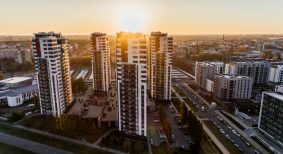Is the heat wave over for homebuying in Ontario?
As summer edges to a halt, a new housing market report is predicting a cool down when it comes to ownership. In his Ontario Housing Forecast 2020-2021, Central 1 Regional Economist Edgard Navarrete is expecting sales to decrease by 2.9 per cent in 2020 before rebounding by 5 per cent next year. Total resale transactions are expected to fall 3.2 per cent in 2020 before a 4.8 per cent recovery in 2021.
Looking back, average home sales across the province’s seven real estate boards jumped 73 per cent between April and May and by 65 per cent between May and June. Toronto – which typically accounts for nearly half of all sales in the province – saw a 29.5 per cent increase over July 2019 and a new sales record for the month of July. The average Ontario home price is expected to increase by 9.8 per cent in 2020 (to $666,443) and by 7 per cent in 2021 (to $713,093).
A few reasons why homebuying will cool off? The report cites economic uncertainty, the removal of government emergency funds such as the Canadian Emergency Response Benefit (CERB), a lack of tourism, a high unemployment rate, range bound wage growth, tepid business investments, and increased consumer and business insolvencies and bankruptcies.
Should a stronger second wave of COVID-19 hit, a worst-case scenario could lead to a drop in home sales in 2020 of 14 per cent over 2019.
Rental Market Insights
A steep decline in tourism—one that will recover slowly—could force investors to minimize risk and/or losses and move units from the short-term rental market to the secondary rental market, adding additional slack to the market and shifting negotiating power from the landlord to tenants.
This year could present a rare opportunity for a smaller pool of potential tenants to negotiate cheaper leases for units in high-demand neighbourhoods, especially in saturated condo apartment markets such as Toronto, the Greater Toronto Area and to a lesser extent markets such as Ottawa-Gatineau, London, and Kitchener-CambridgeWaterloo, before the market begins to tighten-up once again by 2021 on increased immigration and economic
activity
Due to lack of immigration and foreign students, purpose-built vacancy is projected to increase to 2.5 per cent in 2020 (highest in five years), before shifting down to 2.2 per cent in 2021. Average rents for apartments and townhomes are expected to grow slightly by 1.8 per cent in 2020 and by 2.2 per cent in 2021.








